
The aim of the Aspen Ideas Festival is to gather the world’s boldest thinkers for conversation on common challenges and big ideas. The breadth of leadership converged in one “Afternoon of Conversation” at the Festival ranged from the former president of Pakistan to the defense minister of Israel, from the governor of a Republican rustbelt state to a close confidant of President Obama. But throughout all their conversations with some of the most provocative journalists in the business was their quest to further define what a good society means, and how we will get there. Scroll through for some of their most passionate platforms and prescriptions.
Larry Summers, in Conversation with Gillian Tett
 Budgets hawks have made trimming the federal deficit a central issue in the 2012 election, and any suggestion to spend more has become fraught with political peril. But when US Managing Editor of the Financial Times Gillian Tett queried former National Economic Council Director Larry Summers on whether it was irresponsible for the US to spend more when already in debt, Summers made a commanding moral case for shifting the paradigm away from a purely fiscal one. “There is no issue of patriotism or morality or economic prudence that’s more important than what we leave to our children,” he said. “What I cannot understand is why people think that what we have left to our children is measured only by the number of dollars there are in the national debt—that it’s not measured in whether their schools are decent in quality, their infrastructure is repaired, or American leadership has been perpetuated.”
Budgets hawks have made trimming the federal deficit a central issue in the 2012 election, and any suggestion to spend more has become fraught with political peril. But when US Managing Editor of the Financial Times Gillian Tett queried former National Economic Council Director Larry Summers on whether it was irresponsible for the US to spend more when already in debt, Summers made a commanding moral case for shifting the paradigm away from a purely fiscal one. “There is no issue of patriotism or morality or economic prudence that’s more important than what we leave to our children,” he said. “What I cannot understand is why people think that what we have left to our children is measured only by the number of dollars there are in the national debt—that it’s not measured in whether their schools are decent in quality, their infrastructure is repaired, or American leadership has been perpetuated.”
Pervez Musharraf, in conversation
with David Bradley
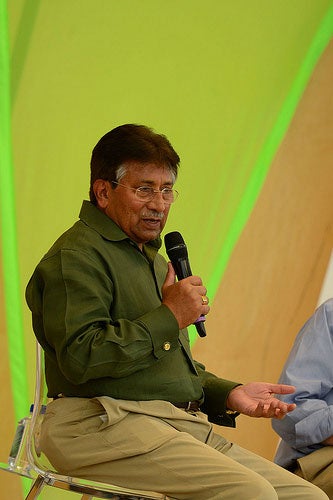 “I’m quite comfortable living in London and Dubai and going on lecture circuits around the world,” ex-president of Pakistan Pervez Musharraf told The Atlantic’s David Bradley. But for the seasoned soldier, who served as chief of army staff before assuming the presidency, comfort doesn’t seem to be comfortable at all. Saying Pakistan is being “run to the ground,” he reiterated his vow to return to Pakistan from self-imposed exile to run for the presidency in 2013. “I’ve seen Pakistan and governed Pakistan,” he said, “and I know it has all the potential to do well for itself. I love the people of Pakistan, so I must go back.” As a survivor of seven assassination attempts, Musharraf had unique credibility when he raised the stakes on his vow: “I will go back,” he said, “even to the peril of my life.”
“I’m quite comfortable living in London and Dubai and going on lecture circuits around the world,” ex-president of Pakistan Pervez Musharraf told The Atlantic’s David Bradley. But for the seasoned soldier, who served as chief of army staff before assuming the presidency, comfort doesn’t seem to be comfortable at all. Saying Pakistan is being “run to the ground,” he reiterated his vow to return to Pakistan from self-imposed exile to run for the presidency in 2013. “I’ve seen Pakistan and governed Pakistan,” he said, “and I know it has all the potential to do well for itself. I love the people of Pakistan, so I must go back.” As a survivor of seven assassination attempts, Musharraf had unique credibility when he raised the stakes on his vow: “I will go back,” he said, “even to the peril of my life.”
Mitch Daniels, in conversation with Charlie Rose
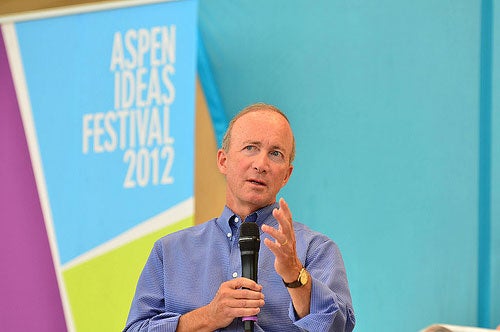 After a week of intense scrutiny for the Supreme Court, and Chief Justice John Roberts especially, Indiana Governor Mitch Daniels expressed hope the country had taken away an important lesson about the Court’s political neutrality. When asked by PBS’ Charlie Rose to guess what Justice Roberts’ motivations had been in voting to uphold the Affordable Care Act, Daniels declined to take a partisan stance. “I am persuaded by the eloquent guesses of others who believe that the Chief Justice and others wanted to protect the court for the long-haul, and frankly, to leave room for legislatures to make what I think was a mistake,” he said. “I don’t think the justices think of themselves through party labels, and I hope we’ll stop thinking of them that way as a society.”
After a week of intense scrutiny for the Supreme Court, and Chief Justice John Roberts especially, Indiana Governor Mitch Daniels expressed hope the country had taken away an important lesson about the Court’s political neutrality. When asked by PBS’ Charlie Rose to guess what Justice Roberts’ motivations had been in voting to uphold the Affordable Care Act, Daniels declined to take a partisan stance. “I am persuaded by the eloquent guesses of others who believe that the Chief Justice and others wanted to protect the court for the long-haul, and frankly, to leave room for legislatures to make what I think was a mistake,” he said. “I don’t think the justices think of themselves through party labels, and I hope we’ll stop thinking of them that way as a society.”
Brian Greene
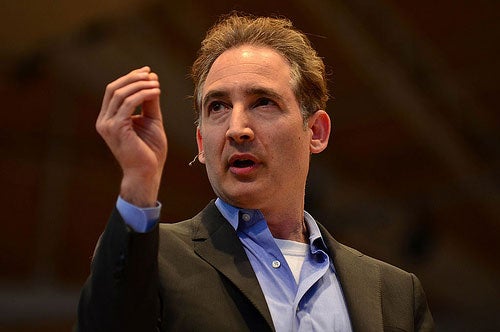 As it turns out, the God particle has nothing to do with God. With the scientific community in a frenzy over the “God particle,” also known as the Higgs particle, set to be tested for in Switzerland this Wednesday, Columbia physicist Brian Greene explained the particle to a lay audience, and made the case for why they should care about it. The Higgs particle hypothesis posits that all space is “suffused with an invisible substance, like a molasses that pervades every nook and cranny,” Greene explained. “As a particle tries to move through this molasses, the resistance it feels as it tries to burrow through is what we interpret as the mass of the particle. If proven true, this re-writes the very meaning of nothingness and empty space.” So why should the non-physicists among us care? Greene invoked the discovery of quantum mechanics in the 1920s as a parallel. “(The discovery) could have seemed equally abstract then,” Greene said. “But in the years since, it has been harnessed by science and technology to yield all manner of spectacular technological wonders. Quantum physics gave us computers, cell phones, and medical technologies that save people’s lives all over the world.”
As it turns out, the God particle has nothing to do with God. With the scientific community in a frenzy over the “God particle,” also known as the Higgs particle, set to be tested for in Switzerland this Wednesday, Columbia physicist Brian Greene explained the particle to a lay audience, and made the case for why they should care about it. The Higgs particle hypothesis posits that all space is “suffused with an invisible substance, like a molasses that pervades every nook and cranny,” Greene explained. “As a particle tries to move through this molasses, the resistance it feels as it tries to burrow through is what we interpret as the mass of the particle. If proven true, this re-writes the very meaning of nothingness and empty space.” So why should the non-physicists among us care? Greene invoked the discovery of quantum mechanics in the 1920s as a parallel. “(The discovery) could have seemed equally abstract then,” Greene said. “But in the years since, it has been harnessed by science and technology to yield all manner of spectacular technological wonders. Quantum physics gave us computers, cell phones, and medical technologies that save people’s lives all over the world.”
General Stanley McChrystal, in conversation with Bob Schieffer
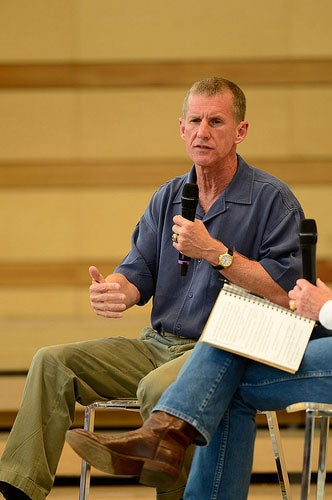 The Festival has been rife with discussion of mandatory national service — reflective, perhaps, of America’s disenchantment with sectors of society from Congress to Wall Street — and former Commander of International Security Assistance Forces in Afghanistan General Stanley McChrystal has been one of the most passionate advocates for the cause. When asked by CBS News anchor Bob Schieffer if a mandatory national service was needed, McChrystal said, “I think we need it at the end of high school, and I don’t think young people would think it’s unfair if everyone does it.” But civic education wasn’t the only sort of education on McChrystal’s mind. When asked to name the greatest threat to national security, he chose America’s failing school system over fundamentalism and rogue nuclear states. “A third of high school kids don’t graduate, which means they’re not eligible for the military. In the remaining two-thirds, you have legal and physical problems, so only a third is even eligible, and that’s the same third you’re competing with Yale and Harvard for.”
The Festival has been rife with discussion of mandatory national service — reflective, perhaps, of America’s disenchantment with sectors of society from Congress to Wall Street — and former Commander of International Security Assistance Forces in Afghanistan General Stanley McChrystal has been one of the most passionate advocates for the cause. When asked by CBS News anchor Bob Schieffer if a mandatory national service was needed, McChrystal said, “I think we need it at the end of high school, and I don’t think young people would think it’s unfair if everyone does it.” But civic education wasn’t the only sort of education on McChrystal’s mind. When asked to name the greatest threat to national security, he chose America’s failing school system over fundamentalism and rogue nuclear states. “A third of high school kids don’t graduate, which means they’re not eligible for the military. In the remaining two-thirds, you have legal and physical problems, so only a third is even eligible, and that’s the same third you’re competing with Yale and Harvard for.”
Valerie Jarrett, in conversation with Walter Isaacson
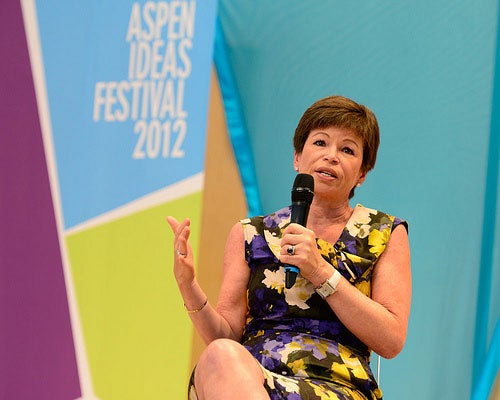 President Obama made headlines in June with his executive order to halt deportations of young immigrants brought to the United States illegally. “The president felt very strongly that we are a nation of laws and immigrants and had to tackle this issue,” Senior White House Advisor and Obama confidante Valerie Jarrett told Institute President Walter Isaacson, but it was clear that she felt strongly about the order, too. “I met with four young adults who walked from Florida to Washington to see the president,” Jarrett said. “They couldn’t come into the White House because they’re here illegally, so I met them at a church across the street, and each time I left a meeting with them, I left in tears, because they are exactly the kind of people we want in this country—they want to run businesses, serve in the military.” Admitting that the order was not a panacea, Jarrett blamed an inert congress for necessitating the stopgap measure. “It’s not the solution,” she said, “but you cannot look into the hearts of these young people and say there’s nothing we can do when there is something we can do.”
President Obama made headlines in June with his executive order to halt deportations of young immigrants brought to the United States illegally. “The president felt very strongly that we are a nation of laws and immigrants and had to tackle this issue,” Senior White House Advisor and Obama confidante Valerie Jarrett told Institute President Walter Isaacson, but it was clear that she felt strongly about the order, too. “I met with four young adults who walked from Florida to Washington to see the president,” Jarrett said. “They couldn’t come into the White House because they’re here illegally, so I met them at a church across the street, and each time I left a meeting with them, I left in tears, because they are exactly the kind of people we want in this country—they want to run businesses, serve in the military.” Admitting that the order was not a panacea, Jarrett blamed an inert congress for necessitating the stopgap measure. “It’s not the solution,” she said, “but you cannot look into the hearts of these young people and say there’s nothing we can do when there is something we can do.”
Ehud Barak, in conversation with Tom Friedman
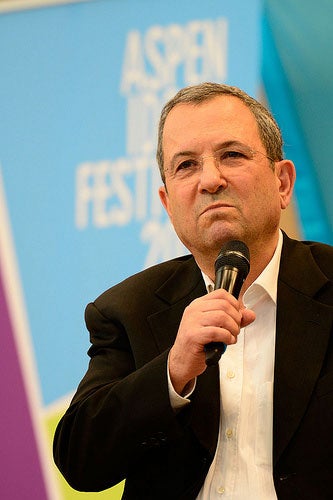 “Israel lives in a tough neighborhood,” Israeli Defense Minister Ehud Barak told Pulitzer Prizing-winning journalist Tom Friedman, “and knows about those who cannot defend themselves.” As such, Barak was uniquely qualified to lend insight on both the tough—Syrian President Bashar al-Assad—and the defenseless—Syrian civilians caught in the crossfire between the brutal government forces and their out-gunned opposition. “Assad is doomed, and can never resume legitimacy,” Barak said. “He cannot complete what (his father, former Syrian President Hafez al-Assad) did, because his father massacred civilians in Hama before the world became so interconnected. But now, it is happening in real time.” But in haunting echoes of Israel’s history, Barak noted the dismay of many Israelis that “even when the whole world knows in real time about totally unacceptable violence and is determined to prevent it, it doesn’t mean that enough political will and unity among nations will be found in order to follow this strong belief with actions.”
“Israel lives in a tough neighborhood,” Israeli Defense Minister Ehud Barak told Pulitzer Prizing-winning journalist Tom Friedman, “and knows about those who cannot defend themselves.” As such, Barak was uniquely qualified to lend insight on both the tough—Syrian President Bashar al-Assad—and the defenseless—Syrian civilians caught in the crossfire between the brutal government forces and their out-gunned opposition. “Assad is doomed, and can never resume legitimacy,” Barak said. “He cannot complete what (his father, former Syrian President Hafez al-Assad) did, because his father massacred civilians in Hama before the world became so interconnected. But now, it is happening in real time.” But in haunting echoes of Israel’s history, Barak noted the dismay of many Israelis that “even when the whole world knows in real time about totally unacceptable violence and is determined to prevent it, it doesn’t mean that enough political will and unity among nations will be found in order to follow this strong belief with actions.”

